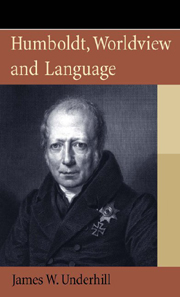Book contents
- Frontmatter
- Contents
- Acknowledgements
- Preface
- Part I Language and World
- Part II Humboldt, Man and Language
- 7 Worldview (Weltanschauung or Weltansicht)
- 8 Sprache
- 9 The Work of the Mind
- 10 Form
- 11 Creativity, Culture and Character
- 12 Catching the Character
- 13 A Seeing and Feeling Worldview
- 14 Four Dangers in the Comparative Approach
- 15 Reformulating the Worldview Hypothesis World
- 16 A Final Word
- Glossary
- Bibliography
- Index
14 - Four Dangers in the Comparative Approach
from Part II - Humboldt, Man and Language
Published online by Cambridge University Press: 12 September 2012
- Frontmatter
- Contents
- Acknowledgements
- Preface
- Part I Language and World
- Part II Humboldt, Man and Language
- 7 Worldview (Weltanschauung or Weltansicht)
- 8 Sprache
- 9 The Work of the Mind
- 10 Form
- 11 Creativity, Culture and Character
- 12 Catching the Character
- 13 A Seeing and Feeling Worldview
- 14 Four Dangers in the Comparative Approach
- 15 Reformulating the Worldview Hypothesis World
- 16 A Final Word
- Glossary
- Bibliography
- Index
Summary
In the last chapter we considered the experience of confronting a foreign worldview and attempting to come to terms with a language's character. The difficulty of the task should not be underestimated. Humboldt himself always stressed that his form of comparative philology would be both laborious and inconclusive. No doubt it would be wise to consider the failure met by others who have striven to make a meaningful contribution to the comparison of languages, before setting off unwittingly to make the same mistakes ourselves. Four forms of error lie in wait for anyone who embarks upon the comparison of languages. These errors concern terms, scope, methodology and motivation.
Firstly, the terms of the debate may be ill-defined. This question has already been partially clarified in the discussion of thought, language and worldview, but it will require further consideration in Chapter 15 which (it is hoped) will serve to refine our terms for speaking about language, and worldview.
Secondly, the scope of the study may blind us to truths about the natures of the languages studied or lead us to misconstrue the aspects we study. This can be seen when Humboldt himself confuses the writings of great writers with the language as a whole within which the writer expressed himself; e.g. confusing Shakespeare's English with English or Goethe's German with German. It can also be seen when we multiply the languages compared, treating them more and more superficially, the more languages we take on board.
- Type
- Chapter
- Information
- Humboldt Worldview and Language , pp. 113 - 119Publisher: Edinburgh University PressPrint publication year: 2009



